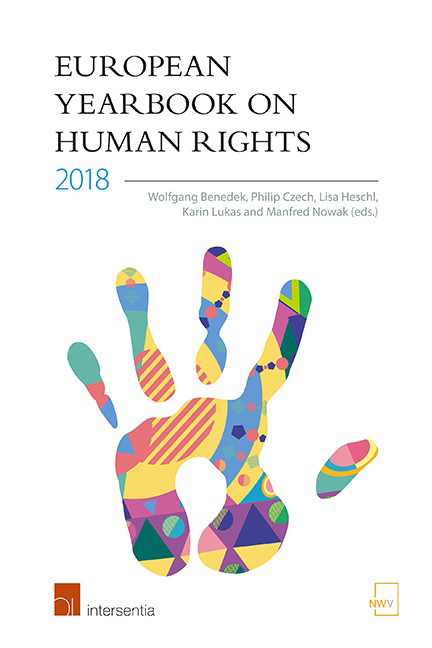Book contents
- Frontmatter
- Scientific Advisory Board
- Editors’ Preface
- Contents
- List of Abbreviations
- List of Contributors
- Part I Topic Of The Year
- Part II Eu
- Part III Coe
- PART IV OSCE
- Enhanced Structure and Geographical Balance: Reforming the OSCE's Human Dimension Meetings
- The Crisis of the International Protection of Human Rights and the Geopolitical OSCE Perspective: ‘The End of Human Rights’, ‘Shooting the Messenger’ or Strengthening Cooperation?
- How Multilateral Organisations can Communicate Better about Human Rights
- Rising Populism and its Impact on Women's Rights: Selected Cases from the OSCE Region
- The Impact of #MeToo on Women's Rights in the OSCE Region
- Part V Others
- Part VI Book Reviews
- Index
How Multilateral Organisations can Communicate Better about Human Rights
from PART IV - OSCE
Published online by Cambridge University Press: 31 January 2019
- Frontmatter
- Scientific Advisory Board
- Editors’ Preface
- Contents
- List of Abbreviations
- List of Contributors
- Part I Topic Of The Year
- Part II Eu
- Part III Coe
- PART IV OSCE
- Enhanced Structure and Geographical Balance: Reforming the OSCE's Human Dimension Meetings
- The Crisis of the International Protection of Human Rights and the Geopolitical OSCE Perspective: ‘The End of Human Rights’, ‘Shooting the Messenger’ or Strengthening Cooperation?
- How Multilateral Organisations can Communicate Better about Human Rights
- Rising Populism and its Impact on Women's Rights: Selected Cases from the OSCE Region
- The Impact of #MeToo on Women's Rights in the OSCE Region
- Part V Others
- Part VI Book Reviews
- Index
Summary
ABSTRACT
Communication technologies and techniques are changing fast. This affects the way all of us create, share and consume knowledge in every sector of our lives. Yet, international organisations and institutions, including the OSCE Office for Democratic Institutions and Human Rights (ODIHR), are oft en seen to be falling behind in their efforts to adopt new ways of communicating about human rights and fundamental freedoms. Multilateral institutions are increasingly not heard. There are many reasons why: because of the hermetic language and old-fashioned means we use, because we fail to reach out beyond our echo chambers and tailor our messages to specific audiences, among others. Such challenges mean that we are not able to communicate about human rights in a way that makes people listen and changes lives. This creates a communication vacuum in which the opponents of human rights can shape a negative public narrative, undermining trust in laws and institutions and giving space to prejudiced, discriminatory and intolerant attitudes that threaten the security of our communities. To ensure that messages about human rights and fundamental freedoms heard and understood by everyday people, multilateral institutions, such as ODIHR, need to create and share these messages in ways that are fit for the realities of the 21st century. In this article, we discuss the urgent need and possible ways for international organisations to communicate more effectively, to be able to show ordinary people that human rights and fundamental freedoms are indispensable in their lives, and to strengthen public support for those rights and freedoms. We will also describe how we at ODIHR have begun to address this communication vacuum.
INTRODUCTION
International organisations and institutions are falling behind in their efforts to adopt new ways of communicating about the human rights and fundamental freedoms they are set up to promote. Multilateral organisations and institutions are increasingly not heard. There are many reasons for this; here, we discuss some of them, roughly grouped into two ‘ baskets ‘ of issues.
The first basket relates to the way we frame our language and messages about human rights.
- Type
- Chapter
- Information
- European Yearbook on Human Rights 2018 , pp. 495 - 520Publisher: IntersentiaPrint publication year: 2018



